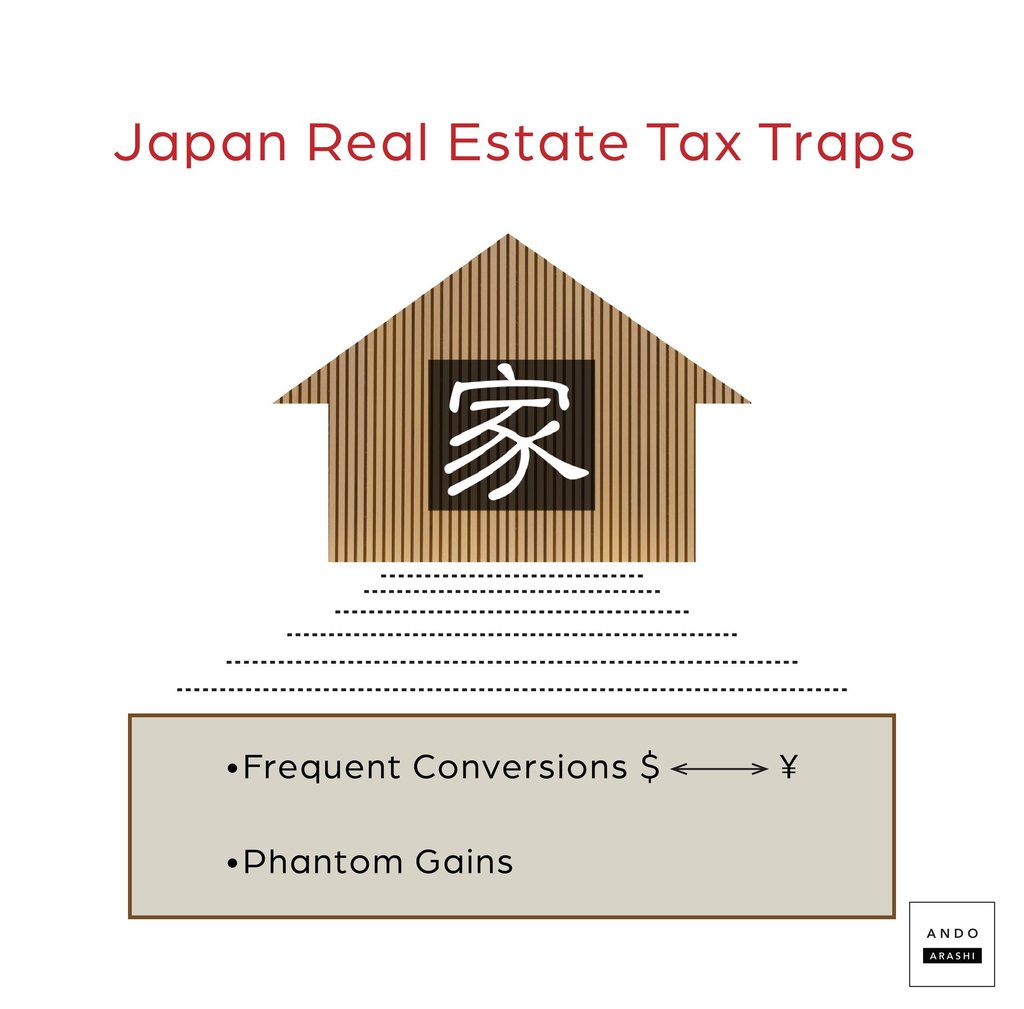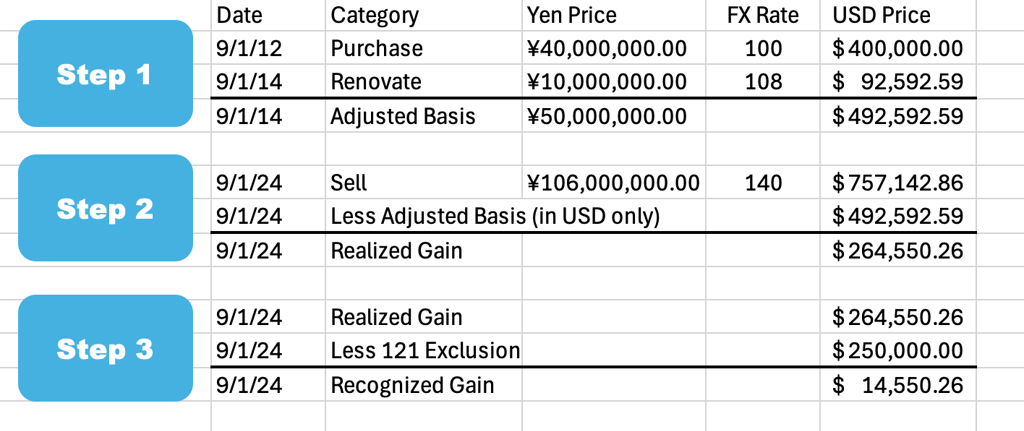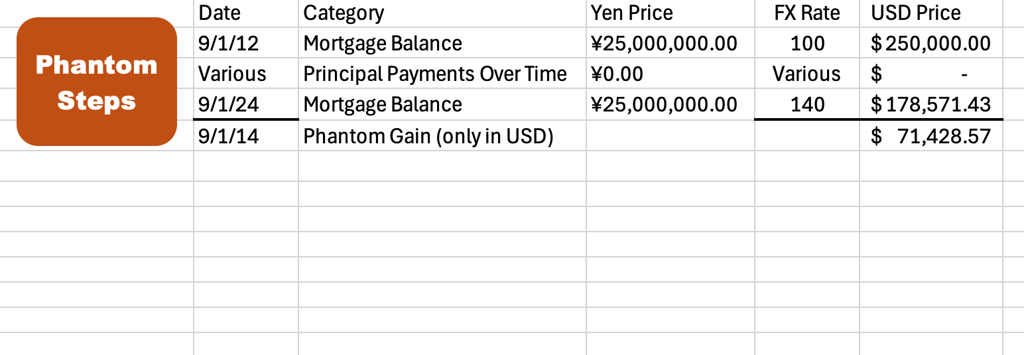Japan Real Estate Tax Traps
Navigating Buying/Selling a Home in Japan
TAX
Andrew Haley
9/9/20243 min read


Congrats...You’ve achieved your dream of buying a house in Japan!
Fast forward 12 years...you sell, only to face a tax nightmare
Why are you being taxed in two countries? What’s this phantom gain thing?
Welcome to the world of foreign real estate!
Let me guide you through...
Here's a reminder how home sales are taxed inside the USA with a single homeowner named Owen
Buy Primary Home (2012) : $400K
+Renovate Home (2014): $100K
=New Adjusted Basis: $500K
Sell Primary Home (2024): $900K
-Adjusted Basis: $500K
=Realized Capital Gain $400K
Furthermore, Owen qualifies for an IRS Sec 121 Exclusion on the gain of the sale
$500K Exclusion (Married)
$250K Exclusion (Single)
Owen is single
$400K Realized Gain
-$250K Exclusion
=$150K Recognized Capital Gain
$150K *15% = $22.5K Capital Gains Tax
That is pretty basic, and most people are aware of how real estate is taxed in the USA
But what all facts remained the same, but property was located in Yokohama Japan?
Then Owen must consider
FX rate
Mortgage Balance
Japanese Cap Gains
FX Rate:
Owen must record the FX rate (¥-->$)
at time of purchase (2012)
at time of major renovation (2014)
at time of sale (2024)
Mortgage Balance:
Owen must track
Original Mortgage Balance (2012); both in ¥ and converted back to $
Every Monthly Payment applied to Principal; both in ¥ and converted back to $
Final Mortgage Balance (2024); both in ¥ and converted back to $
This is giant pain in the a$$
Japanese Capital Gains
As a long-term resident of Japan, Owen has also become a tax resident of Japan, and must file an annual Japanese income tax form
As such, Japan takes first position over the USA for taxing capital gains from sale of a primary residence
Japan also has a primary home exclusion and a special long-term capital gains rate for sales past 10 years
I will spare you the exact math
Essentially:
Owen had a realized capital gain ¥56M ($400K USD) --> Japanese capital gain tax ¥3.6M ($26K USD)
There is no way around this
Then USA takes 2nd position
The US answer is complex because each step in the process needs to be converted into USD
In this case, wild FX swings over a decade reduced his realized gain down to $264K
Minus $250K exclusion, Owen has recognized $14K in capital gains


Summary:
Owen paid $26K USD Capital Gains tax to Japan
Owen paid $2.1K USD Capital Gains tax to USA (multiply $14K recognized gain * 15% rate)
This double taxation could be mitigated via some of the international tax provisions on Owen's US Federal Income Tax Form
If that part wasn't complicated enough due to the currency swings...
Next there's an even more insidious calculation
Phantom Gain (IRS Sec 988)
= Mortgage Value Fluctuations from FX swings
Debt value ⬆️ in USD = No Deduction
Debt value ⬇️ in USD = Ordinary Income
Our first calculation was for the regular capital gain tax; next is for phantom gain because the Yen declined by 40% while owner had this mortgage
In this case, we keep it simple and assume the owner started with a $250K Japanese mortgage and somehow never had to pay it down


At time of sale, Owen has $71K phantom gain which will be considered ordinary income in the USA
In real life, you would also have to track each monthly principal payment and associated FX rate on that day to arrive at the correct phantom number
So the phantom gain is quite cunning...after all Owen personally didn't cause a weaker Yen!
And Owen’s life is now in Japan, conducted mostly in Yen, so he didn't really benefit from that currency weakness either
But what can I tell you?
Those are the rules!
And if the FX rate had gone the other way (getting stronger), then there is generally no allowed deduction (unless you are in some kind of disaster area).
Also seems quite insidious
Come on IRS!
Help out the common Expat here!
And if the FX rate had gone the other way (getting stronger), then there is generally no allowed deduction (unless you are in some kind of disaster area).
Also seems quite insidious
Come on IRS!
Help out the common Expat here!
Other considerations with foreign real estate
Inheriting property: Step Up Basis still applies (with associated FX conversions)
1031 Exchange: Only works foreign --> foreign property, can't mix with domestic
FBAR reporting triggered if property gains deposited in local bank
So that's an overview of buying/selling foreign real estate.
Have you ever purchased and sold a property in Asia before?
What was your experience?
I'd love to hear more about it!
Ando Arashi
878-223-0083
hello@ando-arashi.com


Ando Arashi® is a registered trademark of Ando Arashi LLC.
The firm is a registered investment adviser with the state of Pennsylvania, and notice-filed in Texas and may only transact business with residents of those states, or residents of other states where otherwise legally permitted subject to exemption or exclusion from registration requirements. Registration with the United States Securities and Exchange Commission or any state securities authority does not imply a certain level of skill or training.
© 2026 Ando Arashi LLC. All rights reserved.
